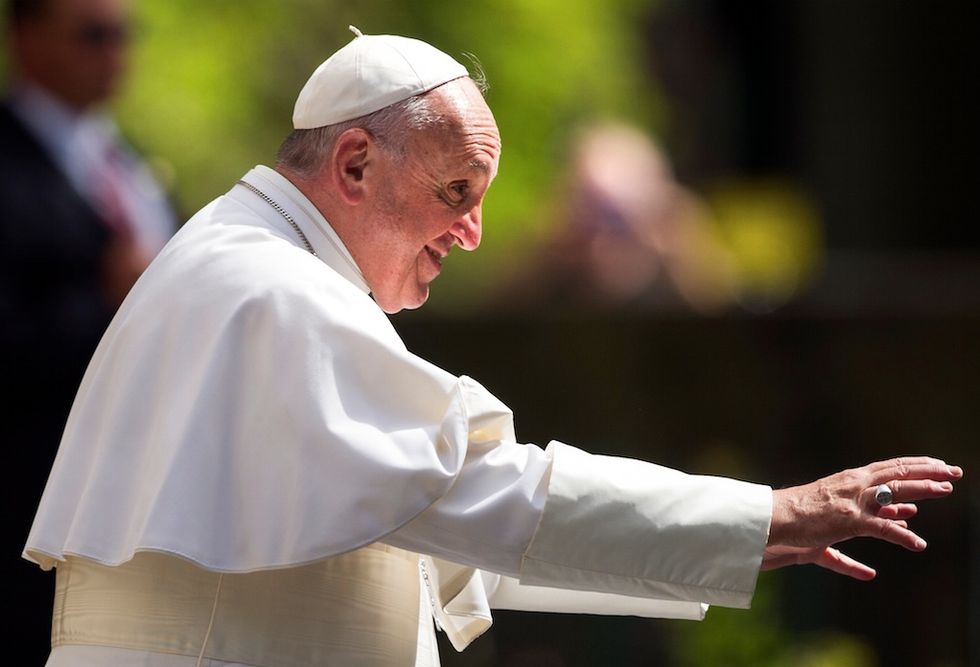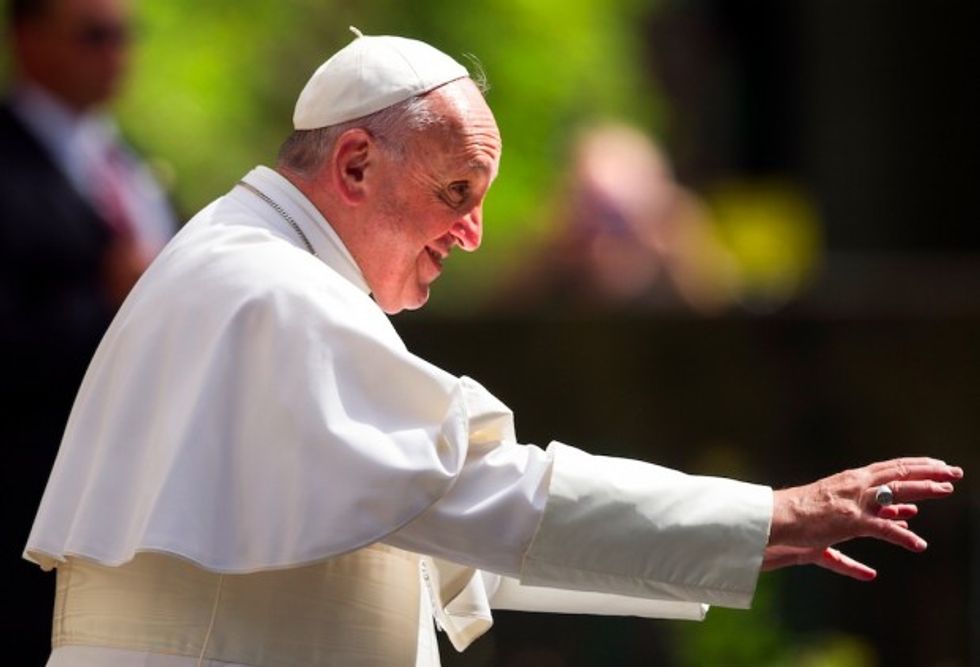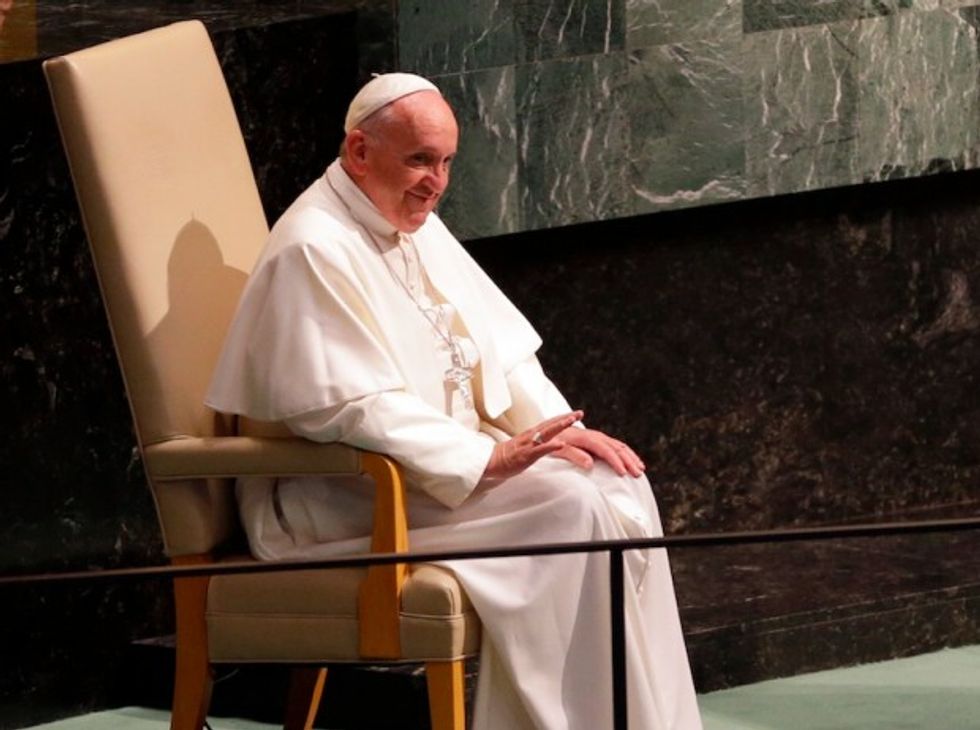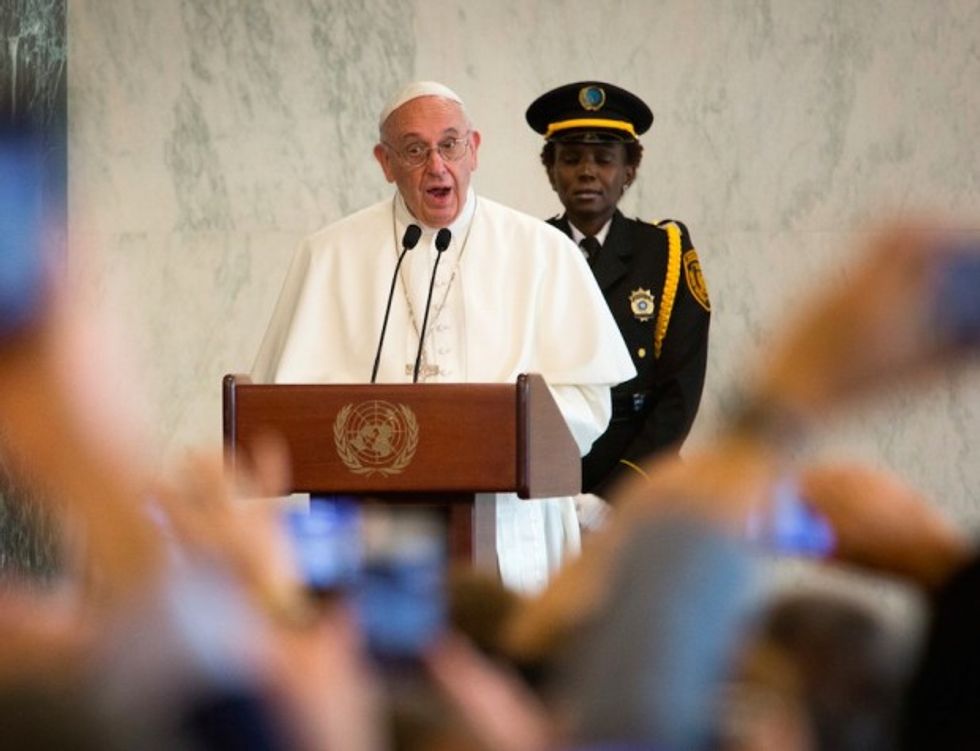
Pope Francis, whose birthday is today, calls salvation a free gift that "cannot be bought." (AP Photo/Cliff Owen)

Pope Francis became the fifth pontiff to deliver remarks before the General Assembly of the United Nations on Friday morning, focusing on issues pertaining to the environment and poverty reduction, proclaiming that a "right of the environment does exist."
"First, it must be stated that a true 'right of the environment' does exist, for two reasons. First, because we human beings are part of the environment," the pontiff said. "We live in communion with it, since the environment itself entails ethical limits which human activity must acknowledge and respect."
The pope, who has repeatedly addressed his concern over climate change in recent months, highlighted his belief that every creature has value in its existence and that Christians, among other monotheistic believers, see the universe as having been created by a higher power. Thus, he urged respect of the Lord's creation, and segued into a discussion about economic disadvantage, repeatedly linking the two issues of concern.

"In effect, a selfish and boundless thirst for power and material prosperity leads both to the misuse of available natural resources and to the exclusion of the weak and disadvantaged," he continued. "Either because they are differently abled, or because they lack adequate information and technical expertise, or are incapable of decisive political action."
Pope Francis went on to call "economic and social exclusion" a "complete denial of human fraternity and a grave offense against human rights and the environment," saying that the poor are cast off, discarded and "suffer unjustly from the abuse of the environment."
"They are part of today’s widespread and quietly growing 'culture of waste,'" he said.
Pope Francis also called for the U.N., with the help of governments around the world, to specifically help protect developing countries from economic abuses.
"The International Financial Agencies are should care for the sustainable development of countries and should ensure that they are not subjected to oppressive lending systems which, far from promoting progress, subject people to mechanisms which generate greater poverty, exclusion and dependence," he said.
The pope went on in the lengthy address to reaffirm that the "natural environment" and the "vast ranks of the excluded" are interconnected and "made increasingly fragile" by powerful political and economic relationships, imploring the audience to better protect the natural world.

He then warned of the consequences of "social and economic exclusion," including: human trafficking, the marketing of human organs and tissues, the sexual exploitation of boys and girls, slave labour, including prostitution, the drug and weapons trade, terrorism and international organized crime, and called on governments to fight back against these paradigms.
The pontiff's speech was clearly aimed at reminding governments and leaders to remember that humanity is that core of each of these issues.
"It must never be forgotten that political and economic activity is only effective when it is understood as a prudential activity, guided by a perennial concept of justice and constantly conscious of the fact that, above and beyond our plans and programs we are dealing with real men and women who live, struggle and suffer, and are often forced to live in great poverty, deprived of all rights," he said.
He touted education for boys and girls, alike, and said that governments must facilitate "the minimum spiritual and material means" to assist people in finding dignity and supporting their families, calling for housing, employment, food, water and religious freedom.
Deep into his speech, the pontiff referred to a defense of the unborn.
"Consequently, the defense of the environment and the fight against exclusion demand that we recognize a moral law written into human nature itself, one which includes the natural difference between man and woman, and absolute respect for life in all its stages and dimensions," he said, later mentioning the "unborn" by name.
Pope Francis called for peace, but also implored the international community to pay close attention to the atrocities unfolding in the Middle East and Africa, where he said Christians, minority groups and even fellow Muslims have faced death and destruction at the hands of radical Islamic groups, though he did not mention those groups by name; the pontiff also included Ukraine in his remarks.

"Not only in cases of religious or cultural persecution, but in every situation of conflict, as in Ukraine, Syria, Iraq, Libya, South Sudan and the Great Lakes region, real human beings take precedence over partisan interests, however legitimate the latter may be," he said. "In wars and conflicts there are individual persons, our brothers and sisters, men and women, young and old, boys and girls who weep, suffer and die."
He continued, "Human beings who are easily discarded when our only response is to draw up lists of problems, strategies and disagreements."
The pontiff repeatedly commemorated the 70th anniversary of the United Nations, praising the achievements that he said have helped to bring order to the international community.
"All these achievements are lights which help to dispel the darkness of the disorder caused by unrestrained ambitions and collective forms of selfishness," Pope Francis said. "Certainly, many grave problems remain to be resolved, yet it is clear that, without all those interventions on the international level, mankind would not have been able to survive the unchecked use of its own possibilities."
Billy Hallowell